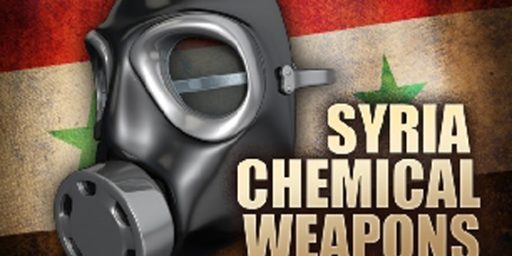Terrorists Using Chemical Weapons in Iraq
The anti-government forces in Iraq have employed chemical weapons against civilians in three separate attacks.
Damien Cave and Ahmad Fadam for the NYT:
A truck bomb that combined explosives with chlorine gas blew up in southern Baghdad on Wednesday, and officials said it may represent a new and deadly tactic by insurgents against Iraqi civilians. It was at least the third truck bomb in a month to employ chlorine, a greenish gas also used in World War I, which burns the skin and can be fatal after only a few concentrated breaths. The bomb killed at least two people and injured 32 others, police and medical officials said. Iraqi and American officials said the use of chlorine seems aimed at bringing a new level of fear and havoc to Iraq as a new security plan for Baghdad takes shape.
[…]
The attacks seem to have been poorly executed, burning the chemical agent rather than dispersing it, but more sophisticated weapons involving chlorine could injure hundreds and cause mass panic.
AP’s Brian Murphy:
It was unclear whether the confluence of new insurgent tactics — attacking isolated combat posts, targeting helicopters more intensely and using chlorine bombs — was coincidental or in response to the U.S. troop increase.
W. Patrick Lang, a former official at the Defense Intelligence Agency, said the insurgents are always “seeking to achieve higher levels of effectiveness” and these new tactics are part of the normal “evolution of sophistication.” Lang said trucks filled with chlorine gas are “really quite deadly” because the gas is potent and spreads easily.
Some authorities believe militants could be trying to maximize the panic from their attacks by adding chlorine or other noxious substances. “It is an indication of maliciousness, a desire to injure and kill innocent people in the vicinity,” said Garver, who also predicted militants may begin to launch similar attacks because of the widespread mayhem caused by this week’s chlorine clouds. “If there is a particular success, we’ll see copycats. … They certainly pay attention to what they think is successful,” he said.
Lang and Garver are both right. The use of chemical weapons in warfare has long been outlawed and the intentional targeting of non-combatants has been verboten for generations. Guerrillas willing to use terrorist tactics, though, are by definition not concerned with such niceties. Further, the very nature of asymmetric warfare is that one side doesn’t fight fair.
It also occurred to me, as it did to Andrew Sullivan, “There is such hideous irony here: we invaded to stop a dictator giving chemical weapons to terrorists.” (Mark Coffey notes the “bitter irony,” too.) I think Sullivan’s being unfair, though, when he adds, “But the result of the botched, under-manned occupation is that the terrorists no longer need the dictator to get them.” Chlorine isn’t exactly enriched plutonium. Indeed, I’ve got some in liquified form upstairs in the laundry room.
Jason Sigger is right to say that these weapons, at least at this level of development, aren’t Weapons of Mass Destruction and that “the actual consequences of the incident hardly merit attention other than another bombing in Iraq – one of many.” A “military official” quoted in Murphy’s AP piece says much the same thing.
Sigger adds,
The real impact of this attack is not the actual casualties, but the psychological impact on U.S. forces and noncombatants in the area. Explosives strapped onto a fuel tanker would have caused many more casualties, but by using an industrial chemical, the insurgents have succeeded in making the military and the media believe that they are escalating the conflict to a new level of unconventional warfare.
Still, Sigger goes too far when he writes, “If a terrorist group is attracted to using industrial chemicals like this, it’s because DHS, the EPA, and other ‘experts’ make such a big deal about being afraid of these kinds of incidents.” The reason chemical weapons have such a powerful psychological effect is not because they are hyped but because they cause slow, painful deaths. Given a choice between being blown to bits by a truck bomb and dying by asphyxiation while getting the sensation that one’s skin is on fire, most people would chose the former. That’s why we’ve outlawed these weapons as inhumane while allowing ever-more-lethal weapons to be used in war.






I guess Terrorist University is adding graduate level courses.